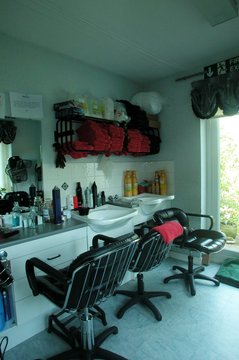Capital Gains Tax
Exempting the primary residence from Capital Gains Tax is a sound principle. It means people can reinvest money from the sale of one house into the next. However this principle does not apply to workhomes with dedicated workspaces, despite the fact that they are their occupants' primary residences. On the sale of a workhome with a dedicated workspace, 18% of the value of the workspace [2011 values] has to be paid in CGT. This leaves the home-based worker with some stark choices:
- Not to move
- To pay CGT and move to progressively smaller or cheaper workhomes to make up the shortfall
- To make sure all parts of the workhome can be seen to be in domestic use
- To operate covertly
Most people choose one of the last two choices, both of which have serious disadvantages.
Many combine ill-suited functions, such as keeping vegetables or drying laundry in their workspace, to meet the requirement that all parts of the workhome are in domestic use. This can lead to frustration, stress and inefficiency, as well as a problem with self-image in relationship to work.
A great many, otherwise law-abiding, UK home-based workers operate 'inconspicuously', especially those who prefer a dedicated workspace within their workhome.
CGT is one of several areas of UK governance that were conceived around the spatiality of the Industrial Revolution, separating dwelling from workplace and are, maybe unwittingly, punitive to the home-based workforce.
Home-based work offers substantial benefits to society and to the individual. The UK could learn from Japanese fiscal and governance policies which support and encourage this popular, family-friendly, and environmentally sustainable working practice.







